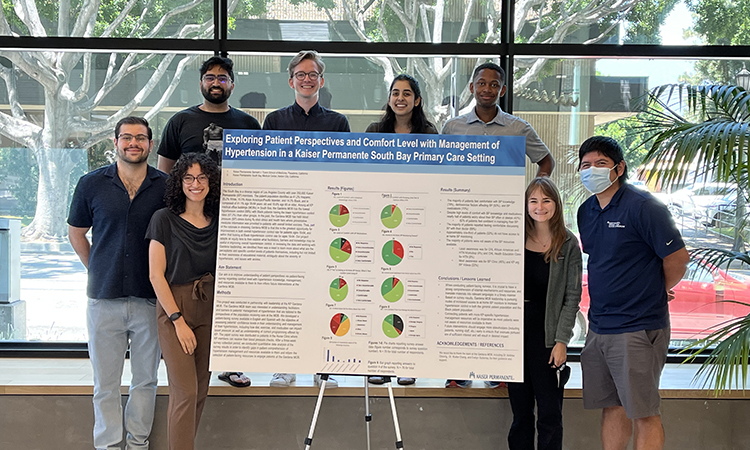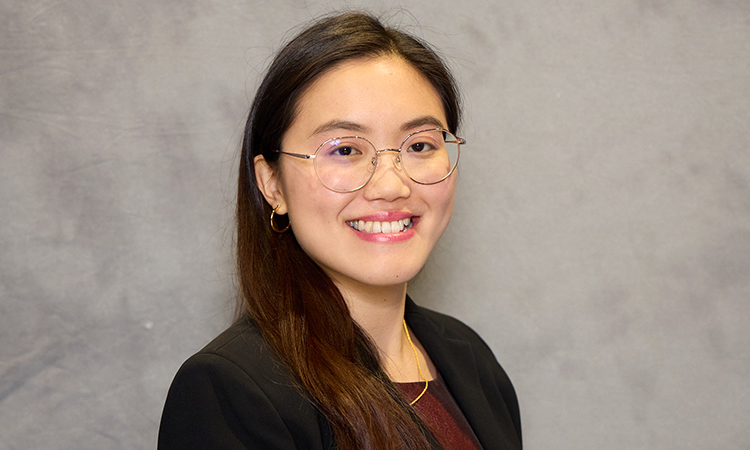As part of the Kaiser Permanente Bernard J. Tyson School of Medicine (KPSOM) integrated curriculum, second-year medical students take part in the year-long, team-based, student-led QUEST (Quality, Excellence and Safety Teams) project, a longitudinal quality improvement experience that focuses on improving care for a chronic disease through a small improvement intervention that is presented at the end of the academic year.
The project is a part of students’ Longitudinal Integrated Clerkship (LIC) requirements and was established through a collaboration between KPSOM, Kaiser Foundation Hospitals (KFH), and Southern California Permanente Medical Group (SCPMG) with the goal of immersing students in early, authentic Health Systems Science (HSS) experiences within a clinical learning environment. Students participate directly in patient-centered QUEST projects to create change and implement interventions directly aimed at saving lives at six local medical centers that are KPSOM LIC sites. KPSOM students are guided by quality improvement leaders from KFH and SCPMG, who volunteer their time to facilitate student work.
“This is a novel program and really impressive work for medical students. I think it showcases what our students can achieve from being embedded within the Kaiser Permanente system,” said Lindsay Mazotti, Assistant Dean for Clinical Education. “Our students explored a variety of topics ranging from how mail-order pharmacies can assist in increasing hypertension medication adherence to highlighting how the implementation of physician-personalized voicemail messages can serve as a blood pressure intervention for certain hypertensive patients. All of these projects have a direct impact on our patients’ health and help achieve high-quality care.”
Students meet monthly with their quality improvement (QI) leads over the course of the year, tying in process improvement concepts from the Health Systems Science curriculum. Anthony Burgos, MD, MPH, Associate Professor of Clinical Science and Health Systems Science, is lead faculty member on the project, and his joint appointment in Clinical Science and HSS helps the team integrate the students’ coursework and engagement with local project leads. Dr. Burgos manages the QUEST program and the bevy of QI specialists who advise and direct KPSOM students throughout the year, along with Daniel Garcia, the program’s site coordinator.
“The QUEST project is designed to help our students gain and utilize practical knowledge, skills, and attitudes from the HSS curriculum, and connect those elements with the threads of health promotion, interprofessional collaboration, advocacy, leadership, and equity, inclusion, and diversity,” said Dr. Burgos. “The project also helps our students understand and overcome barriers to change within a clinical microsystem. We salute these students who all have shared innovative ideas that will serve as practical solutions to improve patient health.”
This year’s projects include the following:
“You’ve Got Mail! Improving Blood Pressure Control Through Greater Mail-Order Pharmacy Utilization”
Students: Kaleigh Allen; Michael Chapek; Henry Dong; Victor Escobedo; Deshae Gehr; Olivia Goodman; Anna Richards; and Daniel Zhong. Project Leads: John Humphrey, Consultant IV, Consulting Services; Terri Ma, Complete Care Director.
“Exploring Patient Perspectives and Comfort Level with Management of Hypertension in a Kaiser Permanente Primary Care Setting”
Students: Priyanka Achalu; Christian Botz-Zapp; Jordan Cornwell; Jesus Fuentes; Jacob Ghahremani; Sameer Goyal; Paula Hornstein; and Shaheed Muhammad. Project Leads: Ruthie Goldberg, Complete Care Director; Maggie Hopps (co-author), Consultant III, Consulting Services.
“Feeling the Pressure: Encouraging Routine Blood Pressure Monitoring in Patients with Uncontrolled Hypertension via Text-Messaging-Based Campaign”
Students: Maryam Ahmad; Nala Al-Khatib; Ahmad Alach; Saadiq Garba; Wilkin Muñoz Orozco; Neipori Pelle; Jacqueline Xu; and May Let Wah (Jacqueline Binsol, Assistant Manager Ambulatory Department Care RN/Department Administrator, and Evan Low, IT Consultant I, are also co-authors). Project Leads: Stephanie Carlos (co-author), Assistant Manager Internal Medicine; Kristina Stracke (co-author), Complete Care Director.
“Implementation of a Remote Blood Pressure Monitoring Program; Satisfaction, Strengths, and Further Opportunities for Improvement”
Students: Jacob Abrahams; Amina Ahmed; Margaret Chell; Mariel Colella; Cortez Johnson; Daniela Wong Pacheco; Hunter Richards; and Iris Smith (Kelly Ko, Complete Care Project Manager, is also a co-author). Project Leads: Danielle Davis, Assistant Manager, Medical Office Administration; Minyong Kim (co-author), Complete Care Director.
“Home Blood Pressure Monitoring at a Local Clinic: A Quality Improvement Initiative”
Students: McKenzie Culler; Hoejeong Kim; Isabella Ramirez; Hailey Shoemaker; Ariel Silverman; Brandon Towns; and Ariana Vajdi. Project Leads: Michael Armas (co-author), Project Manager, Population Care Management; Tiffany Chuang (co-author), Complete Care Director.
“Improving Hypertension Control with Physician-Personalized Voicemail Messaging”
Students: Aya Badran; Cristo Carrasco; Kristian Diaz; Michael Langevin; Hayden Ngan; Caroline Snead; and Virginia Xie. Project Leads: Erlinda Crisolo, Complete Care Director; Deborah Gonzales, Supervisor, Population Care Management.



